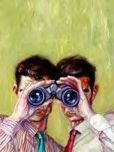> I didn’t realize Fugue was so odd. Or maybe I did–I have read a number of issues–and just forgot. I hope I don’t forget again, because I’ve got some oddball stories that they might be interested in. (I don’t know if this was just a printer’s error or another sign of the magazine’s quirkiness, but my copy was printed upside down and backwards; that is, the cover was on wrong.)
I didn’t realize Fugue was so odd. Or maybe I did–I have read a number of issues–and just forgot. I hope I don’t forget again, because I’ve got some oddball stories that they might be interested in. (I don’t know if this was just a printer’s error or another sign of the magazine’s quirkiness, but my copy was printed upside down and backwards; that is, the cover was on wrong.)
The fiction in the issue begins with “Mariposa Girls” by Tessa Mellas, about figure skaters who discover that if they skate naked, with the blades of their skates screwed directly into their feet, that they come close to perfection. Hmmm.
Then there’s “Omaha, Nebraska” by Brent Van Horne. This one isn’t odd like the first one, but it is quirky, or at least it’s populated by very quirky people. If it weren’t, I don’t suppose a bus trip in a snowstorm would be very exciting. But the narrator is on his way to Omaha because “people say my brother in Omaha, Nebraska.” And on the way he observes his fellow travelers, including a girl with a red bag who doesn’t much like being so closely observed. Again, hmmm. I was fully engaged, but never sure why. So I finish the story and go out to get the mail and there’s a rejection for a story I submitted (a quirky, story, I might add) to Mid-American Review and the rejection slip is signed by Brent Van Horne, Assistant Fiction Editor. That’s more coincidence than you’d allow to happen in your fiction, but in real life it’s probably okay. I wonder if the brother in the story is Derek? (Just kidding–I came across Brent’s brother’s very interesting website and, also being a Hoosiers fan (and a Hoosier), I couldn’t not include this link.)
“The Deer” by Jonathan Ritz is flash fiction that seems to be headed deep into familiar territory when suddenly, boom, we shift into a whole other dimension. This one isn’t quirky, it’s maybe a little too sentimental, but makes for a nice short piece.
Brian Maxwell’s “Five Stars for Your Maker” is another story about quirky characters, this time a woman who’s eye is put out by a kid’s make-shift cannon and whose husband tries to cheer her up by dressing in costumes. Maybe every journal needs a dark story; this would be it for this one.
I almost didn’t mention “Family Debates, 1978-1983” by Anthony Varallo, which is hard to classify. Clever, for sure. He had me until the dead dog chimed in . . .
Speaking of editors, the issue includes a poem “when the dogs come running” by Tracy Truels, editor of Indiana Review: “when the dogs come running from the house search out the safety of the olive tree”
And then back to quirky again with “Rise, Great Ape!” by William Giraldi, about a male nurse who has to deal with the arrival in the E.R. of a famous scientist and his pet monkey. I mean gorilla. Lou (short for “loser” one childhood tormenter told him), has lots to worry about, including contemplating the “humanity” of Lange (named after Jessica Lange!) the gorilla. (More editors: it turns out Giraldi is an Associate Fiction Editor for Agni, so there’s a possibility he’s had a hand in a recent rejection also . . .)
The final story in the issue is “Old People Sitting in Their Cars” by Michael Landweber. Now this story has plenty going for it—the relationship between the narrator and his girlfriend Raven is fascinating—but I couldn’t get past the setting, in an apartment building on 18th St. in Washington, D.C., overlooking Corcoran. I used to live near there and tried to imagine the view from the window. Sorry, Michael—not your fault!
This was a good issue of Fugue, with lots to think about.
Next up: Cimarron Review
